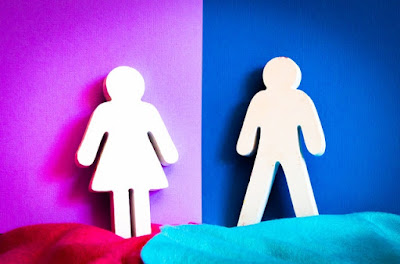Trans Rights - The Newest Civil Rights Movement
This week’s film, Disclosure, centered on the history
and hardships that transgender persons have had in the United States. The film highlighted
how media portrayals of the transgender community have changed since the 1920’s
and the struggles that still remain to this day.
 |
| (Photo Credit: pexels.com) |
screen but sadly as the butt of the joke. Used as jesters and deviants, comic relief, or as people who did not quite fit in, the transgender community was sidelined and in most of the United States, criminalized.
As the film described, transgender people in the media were
often portrayed as villains or victims. Alfred Hitchcock often had the murderer
in his story as a cross dressing person. Films like Silence of the Lambs,
The Crying Game, and Dressed to Kill all have cross dressing
characters who are the villains. The film brings to the forefront that because
over 80% of Americans do not know a transgendered person, their only knowledge
comes from movies or TV, and when you are portrayed as a victim or killer the
human imagination only runs wild.
The film continues to explain how over time things have
slowly started to “come around” for transgendered individuals by having more
and more stories told and played by openly trans people. Of course, if you look
at today’s headlines in newspapers one may not believe that progress has been
made.
Transgender Against the Law
 |
| (Photo Credit: pexels.com) |
Dating as far back as 1848, laws in the United States were enacted
to keep “a person from appearing in public ‘in a dress not belonging to his or
her sex’” (PBS). Oddly enough, one law was enacted in New York because it was
becoming increasingly common for people to dress up to get out of paying taxes,
not as a punishment for what we today call the LGBTQ+ Community. “The state
originally intended the law to punish rural farmers, who had taken to dressing
like Native Americans to fight off tax collectors” (Ryan). Sadly, “‘by the
beginning of the 20[th] century, gender inappropriateness… was increasingly
considered a sickness and public offense’” (Ryan). These laws only furthered the
bigotry towards those who were different.
This is an ongoing problem in our society today, headlines
like “Record number of bills look to restrict trans rights in the U.S.” and “Transgender runner CeCe Telfer is ruled ineligible to compete in US Olympic trials” only shows
that there is a long road ahead. Yet on the opposite side of the coin, headlines
like “New poll shows Americans overwhelmingly oppose anti-transgender laws”
show that perhaps change is truly around the corner. I know that I personally
have voted for people and given money to organizations that fight back against
inequality in all forms. I have spoken my mind and even lost a job over my
belief that no one should suffer discrimination. My personal solution is to
keep speaking out, keep donating money, and to keep voting for people who hold
the same values I do. I hope one day perhaps I can even be on the legal team
for one of these organizations.
 |
| (Photo Credit: pexels.com) |
To be able to talk about other community's exclusion in media
would require me to consume more media. I stay away from almost all network
television shows, and I have not seen a new film since Star Wars: The
Force Awakens. At home we do not have cable television and since our
antenna gave out in 2018, we have not watched the few networks we were able to
get with an antenna since. Even then, our TV was only ever on PBS and usually
only for Nova, America’s Test Kitchen, or Nature.
I know though reading newspaper articles and headlines
online about how the Academy Awards is always being labeled as whitewashed.
This saddens me greatly, but because I do not even know the title of any of the
films nominated. Nor have I spent money on tickets for a film, I really have no
weight on what Hollywood is doing.
I can guess that people of color, native populations, people with disabilities, and LGBTQ+
are greatly underrepresented in media, but for concrete examples I would be
simply guessing. I know that being a white woman this could come off as callous
or privileged, but I do not consume normal media. My evenings are often spent playing
puzzle games, gardening, or cooking.
Works Cited:
“Arresting Dress: A Timeline
of Anti-Cross-Dressing Laws in the United States.” PBS News Hour Weekend,
Public Broadcasting Service, 31 May 2015, www.pbs.org/newshour/nation/arresting-dress-timeline-anti-cross-dressing-laws-u-s.
Ryan, Hugh. “How Dressing
in Drag Was Labeled a Crime in the 20th Century.” History.com, A&E
Television Networks, 25 June 2019,
www.history.com/news/stonewall-riots-lgbtq-drag-three-article-rule.


Thank you for digging into the illegality of crossdressing in the US, I was actually very surprised to hear about that.
ReplyDeleteGreat information on some of the legal history!
ReplyDelete